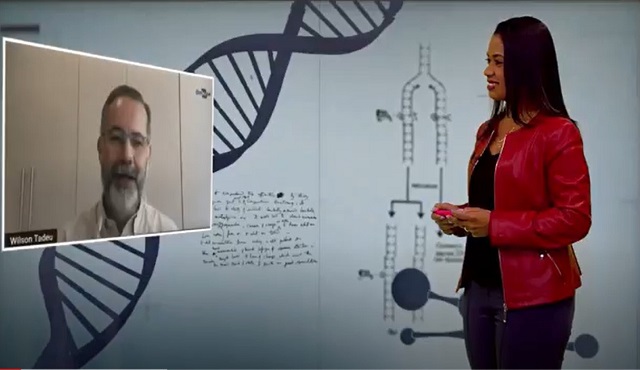
By observing nature, a technical solution was born that made it possible to increase the income of the product, in addition to contributing to reducing the impacts on the environment. It is an aquarium, a small ecological plant for the treatment of effluents from dug nurseries, which also allows the production of flowers. This was explained by researcher Wilson Tado Lopez, of Embrapa Instrumentação (São Carlos/SP), in an interview with Science Connection. “In science it is possible to start from the basic sciences, but also from observing the working of nature. An aquaculture garden is an example. We rely on wetlands that occur in nature over millions of years to build a system that we call built wetlands. Based on this concept We have developed a system that treats water and reuses it in aquaculture production systems, the researcher explained, explaining that the system works like a small lake. These plants, as well as microorganisms, in addition to this filtering medium produced by the expanded clay, filter and process the water naturally. In other words, we convert that information that nature gives us into a technical solution.” According to Lopez, this technology is easy to maintain and has low construction and operating costs. Moreover, it reduces organic matter in the water without adding any chemicals. Not to mention the possibility of Use of treated water for other activities. He noted that “the aquaculture garden is an example of good fish farming practices, as recommended by the United Nations, in the Sustainable Development Goals, and the Sustainable Development Goals, as one of its advantages is the rational use of water.” After the trial phase, Embrapa is now looking for partners so that the technology can be commercialized and can be adopted by a large number of producers throughout Brazil. The idea is to turn this technology into a product. What we want is to develop a production system that respects the environment. He concluded that the aquaculture garden It is an excellent example of how economic development can be reconciled with social and environmental development.” Interested in establishing a partnership, contact us via email [email protected] where [email protected] Check out the full interview here. Access Embrapa’s YouTube channel and watch other interviews.
By observing nature, a technical solution was born that made it possible to increase the income of the product, in addition to contributing to reducing the impacts on the environment. It is an aquarium, a small ecological plant for the treatment of effluents from dug nurseries, which also allows the production of flowers. This was explained by researcher Wilson Tado Lopez, of Embrapa Instrumentação (São Carlos/SP), in an interview with Science Connection.
“In science it is possible to start from the basic sciences, but also from observing the working of nature. An aquaculture garden is an example. We rely on wetlands that occur in nature over millions of years to build a system that we call built wetlands. Based on this concept , we have developed a system that treats water and reuses it in aquaculture production systems, the researcher explained, explaining that the system functions like a small lake.
“We insulated the bottom with a geomembrane filled with expanded clay and placed plants that are adapted to aquatic environments. These plants, along with microorganisms, as well as this filtration medium produced by the expanded clay, naturally filter and treat the water. In other words, we convert that information that nature provides us with a technical solution.”
According to Lopez, this technology is easy to maintain and has low construction and operating costs. Moreover, it reduces the organic matter in the water without adding any chemicals. Not to mention the possibility of using treated water for other activities. He noted that “the aquaculture garden is an example of good fish farming practices, as recommended by the United Nations, in the Sustainable Development Goals, and the Sustainable Development Goals, as one of its advantages is the rational use of water.”
After the trial phase, Embrapa is now looking for partners so that the technology can be commercialized and can be adopted by a large number of producers across Brazil. The idea is to turn this technology into a product. What we want is to develop a production system that respects the environment. He concluded that the aquaculture park is an excellent example of how economic development can be reconciled with social and environmental development.”
Interested in establishing a partnership, contact us via email [email protected] where [email protected].
paying off Here The interview is complete.
arrive to channel From Embrapa on Youtube and watch other interviews.
Source: ambraba

“Wannabe internet buff. Future teen idol. Hardcore zombie guru. Gamer. Avid creator. Entrepreneur. Bacon ninja.”

